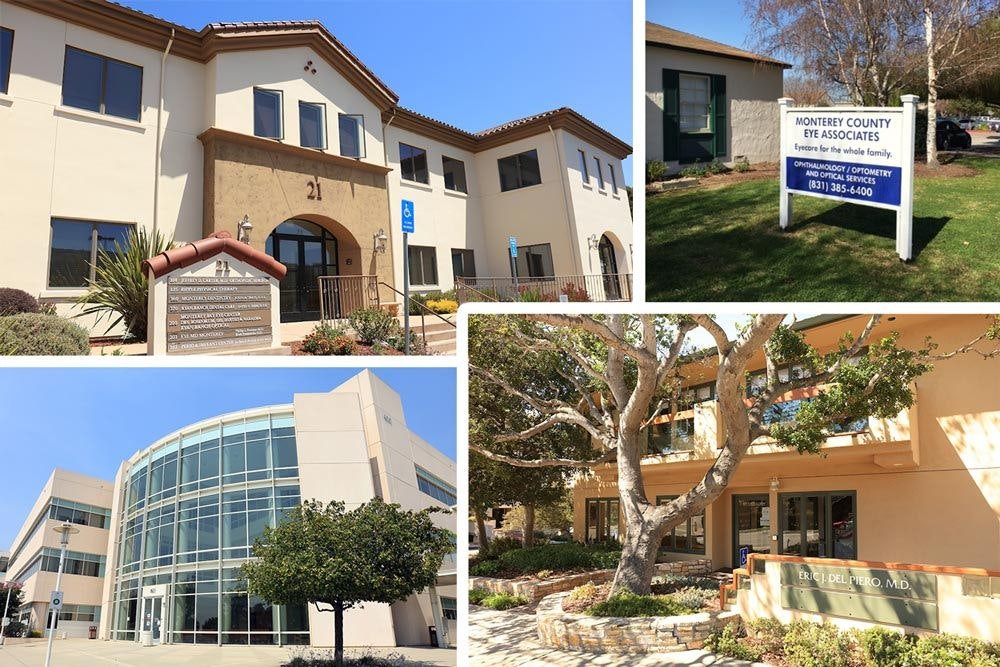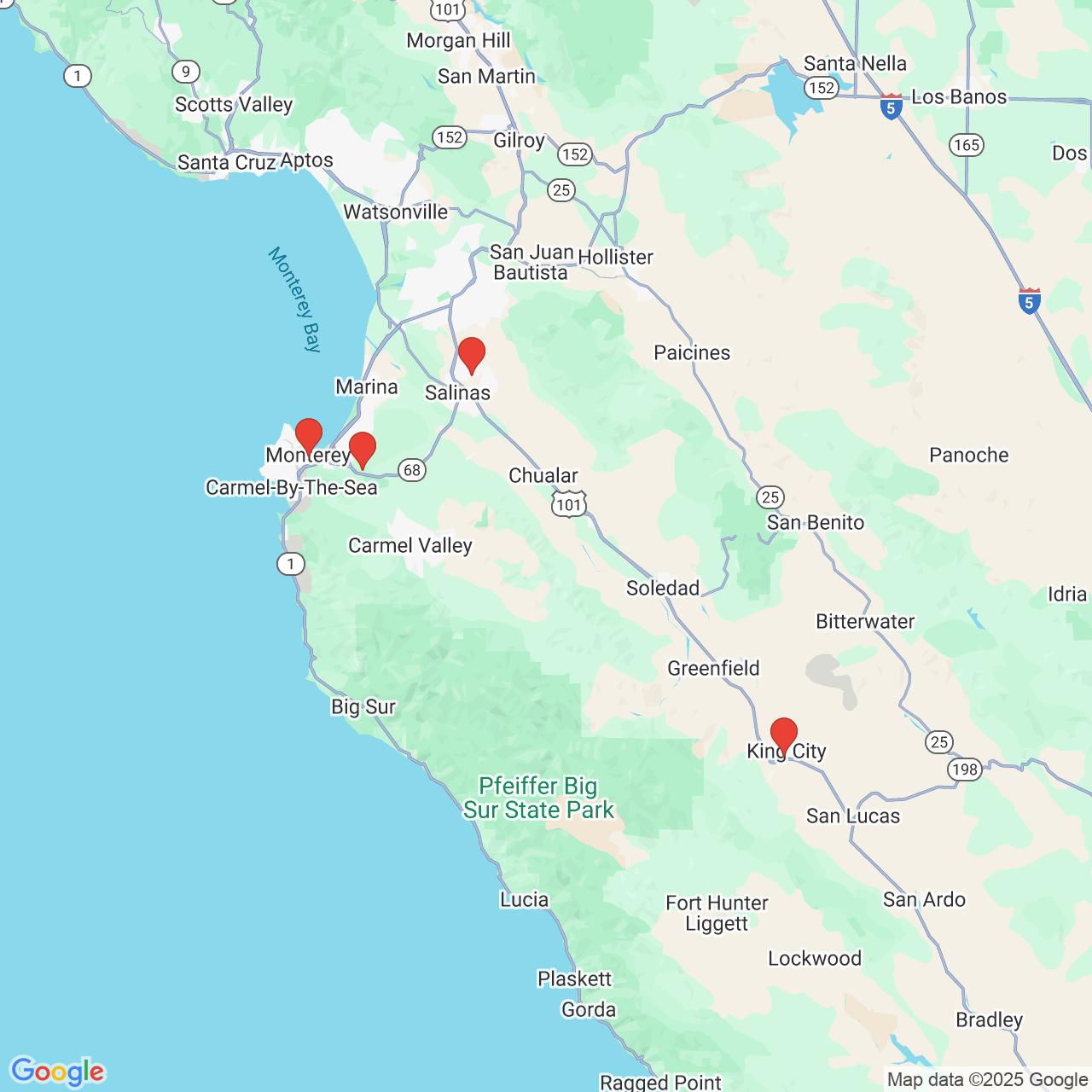Macular Degeneration
Age-related macular degeneration results in vision loss over time, making things like reading and driving difficult or even impossible.
Catching this condition early can help slow its progression, allowing you to enjoy your hobbies and maintain your independence.
Monterey County Eye Associates in Monterey, CA, can help you preserve your central vision for as long as possible.

Understanding Macular Degeneration
Macular degeneration is a retinal condition in which central vision becomes impaired, meaning people with the condition often can't see what's right in front of them. Typically occurring in people over the age of 50, macular degeneration is often an age-related condition. Age-related macular degeneration (AMD) occurs when the macula becomes damaged. The macula is the central part of the retina and is responsible for a person's ability to make out the finer details of whatever they're seeing.
With macular degeneration, reading, driving, cooking, doing at-home repairs, and recognizing the faces of your loved ones can all become difficult. While central vision may be lost, patients can still see out of their peripheral vision. Macular degeneration can affect one or both eyes and with different levels of severity.
Macular Degeneration Causes Problems for Many Older Adults
/
According to the National Eye Institute, age-related macular degeneration is one of the leading causes of vision loss for older adults.
The Signs and Symptoms of Macular Degeneration
Age-related macular degeneration typically progresses slowly, and you may not notice symptoms until it progresses into the later stages. If you are developing macular degeneration, you may notice symptoms like:
- Wavy vision
- Blurred vision
- Difficulty seeing in low light
- Blank or dark spots in your vision
- Changes in the way you see colors
- Vision loss in the central field of vision
People rarely go blind from age-related macular degeneration.

Treatment Options for Macular Degeneration
While there is no cure for macular degeneration, prompt treatment at our Monterey ophthalmology office can help slow the progression of the disease and help alleviate some of the symptoms. Certain lifestyle changes and procedures with our ophthalmologists can be beneficial in preserving your vision. Depending on the stage and type of your AMD, we may recommend:

Nutritional Supplements
Certain nutritional supplements can help slow the progression of AMD and keep it from turning into late-stage AMD. Your ophthalmologist can determine if it would benefit you to take a combination of vitamin C, vitamin E, lutein, zeaxanthin, zinc, and copper.

A Healthy Diet
Getting nutrients and antioxidants through your diet can help slow the progression of dry age-related macular degeneration. We recommend eating a balanced eye-healthy diet with plenty of fish, dark leafy greens, and yellow fruits and vegetables.

Medications
Certain medications can be injected into the eye to slow the progression of age-related macular degeneration. With dry AMD, a medication can be injected to slow the atrophy of the macula. If you have wet AMD, anti-VEGF medications can be injected into your eye to reduce the number of abnormal blood vessels in your retina and slow the leaking of blood vessels.

Photodynamic Therapy
Photodynamic therapy is a combination of injections and laser treatment that can help treat wet AMD. The procedure seals off the abnormal blood vessels to prevent further vision loss.

Laser Surgery
Laser surgery with our team at Monterey County Eye Associates may be used to treat some types of wet AMD. In this procedure, an eye surgeon shines a laser on the blood vessels to stop them from leaking and growing.
"I would highly recommend without hesitation."
I have been a patient of Dr. Rosenblum for many years. He is the absolute best physician, professional, caring and extremely skilled. He has not only managed my twice yearly eye care, but has performed laser surgery two times, all to excellent outcomes... I would highly recommend Monterey Bay Eye Center without hesitation.
View on GoogleDr. Hustad is always thorough. He is a physician that takes time to make sure patients questions are answered and concerns are addressed. The staff are competent and efficient.
View on GoogleMaking Eye Care Affordable
Our team is flexible in financial matters because we want all of our patients to be able to comfortably afford vision care. We accept nearly all insurances and will coordinate with your provider to maximize your benefits.
If you have out-of-pocket expenses, we will work with you to make paying for your care as stress-free as we can. We also accept most major credit cards so paying for your care is easy.
"Doctor Husted thoroughly examines my eyes, and ensures they are healthy. Looked inside for macular degeneration, and retinal problems. Had assistant take photos for better views. Equipment totally up to date! He really cares about his patients eye care & well being!" - Diane Davis
Diagnosing AMD
Amsler Grid
During an eye exam, our ophthalmologist may have you look at an Amsler grid. This is a simple grid containing a black dot at the center. If the lines of the grid appear wavy or distorted, you may have macular degeneration or another eye disease.
Dilated Eye Exam
Your ophthalmologist will use eyedrops to widen your pupil. They will then use a special lens to look through your eye to detect changes in the retina and macula. A dilated eye exam can help detect the presence of drusen, protein deposits that form on the macula. A large number of drusen is an indication of early age-related macular degeneration.
Optical Coherence Tomography
This non-invasive imaging test can take detailed pictures of the retina and macula to diagnose eye diseases like age-related macular degeneration, glaucoma, macular holes, abnormal blood vessels, and more.
Who's at Risk for Macular Degeneration?
While people over the age of 50 are at risk for developing age-related macular degeneration, people of younger ages can develop macular degeneration due to factors like:
- Having a family history of macular degeneration
- Eating a diet higher in saturated fats
- Having high blood pressure
- Having high cholesterol
- Experiencing a head injury
- Having a poor diet
- Being overweight
- Having diabetes
- Being white
- Smoking
To help prevent AMD, try to stay active, eat healthy, and avoid nicotine products. Attending routine eye exams can help catch macular degeneration early and slow the progression of the disease.
"I am very pleased."
From the reception staff, the folks providing the testing, all the way to Dr. Shi, nothing but the most respectful and attentive service. I am very pleased.
View on GoogleMonterey Bay Eye Center has excellent doctors and staff. I highly recommend it and have been a customer for almost 20 years.
View on Google



